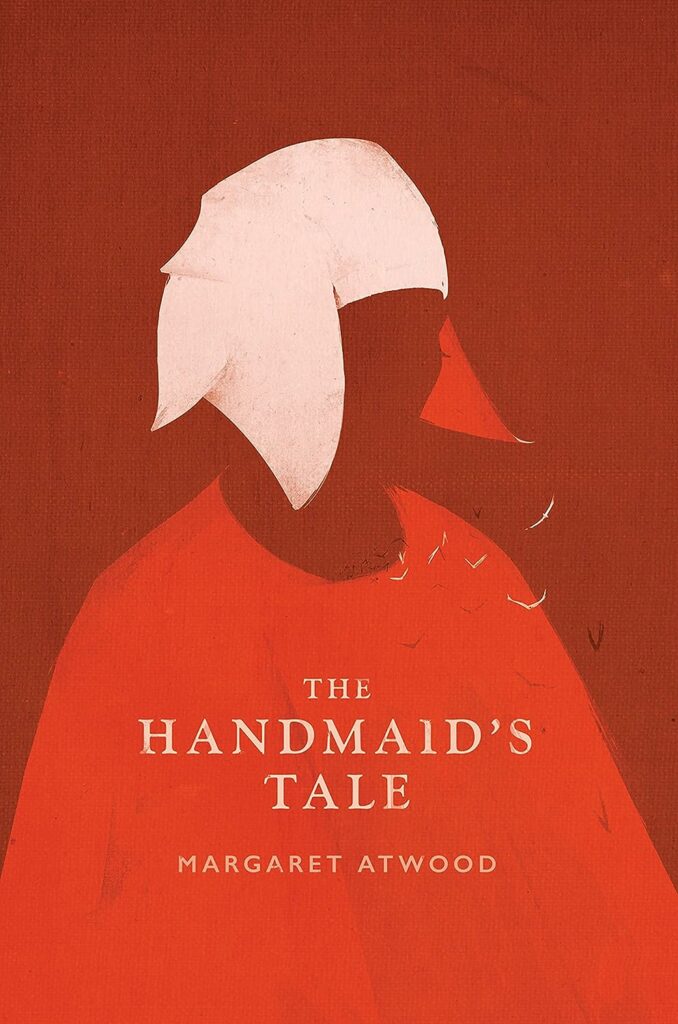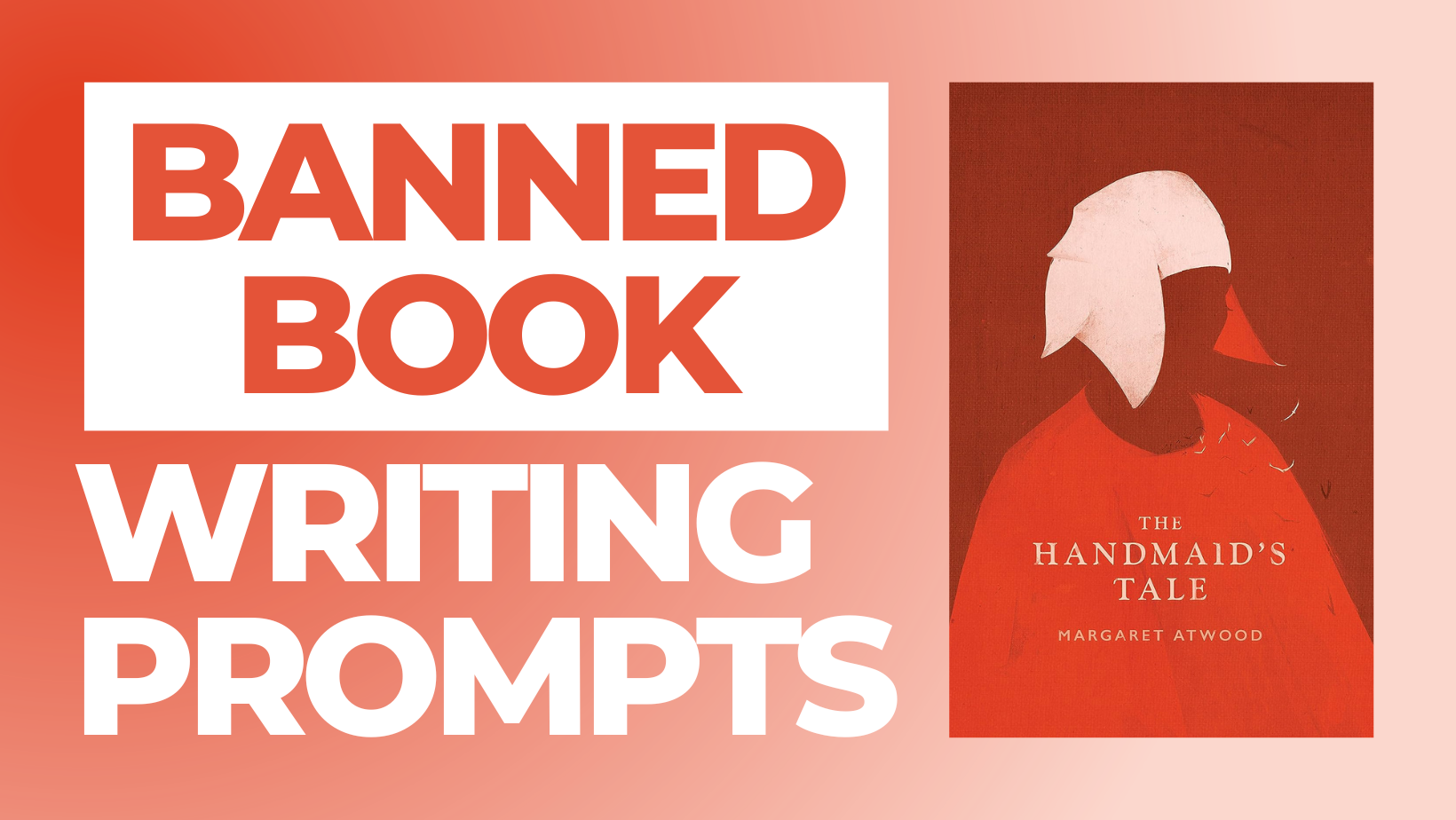In Banned Book Writing Prompts, a new series in Teachers & Writers Magazine, we aim to push back against the growing movement to censor what students can read and to show what happens when we enthusiastically embrace banned works rather than fear them. You can read an introduction to this series by Susan Karwoska here, and you can find more Banned Book Writing Prompts here.
Ordinary life . . . is what you are used to. This may not seem ordinary to you now, but after a time it will. It will become ordinary.
—Margaret Atwood
I was in my early 20s, in college, the first time I read Margaret Atwood’s The Handmaid’s Tale, and I remember how disturbing it was to come across this harrowing depiction of a society intent on stripping women of all agency. What truly haunted me about the book, though, was its evocation of an alternate reality that seemed so eerily plausible it was almost familiar.
In the classes I attended, in the sports I played, and in the waitressing and other service jobs I worked throughout those years, I saw daily how my world was shaped by the forces Atwood was describing, forces I was just beginning to understand. The questions Atwood was raising about the nature of oppression and resistance rattled me, but they also gave me a language for what I was seeing.
Rereading the book all these years later, I see Atwood was more prescient than I imagined back then. We are living through a time when challenges to reproductive rights are ongoing and relentless, when many in power are pushing to limit LGBTQ+ and trans rights, and when attempts to censor what students can read and hear in school are surging. This, Atwood tells us, is precisely how a democratic society like our own might descend into the madness and cruelty she depicts in The Handmaid’s Tale. This, she is saying, is how easily it could happen.
What Atwood made plain to me is that the totalitarian impulses that led to the dystopia she described have always been with us, are with us now—impossible to miss if we only look.
Atwood’s book, though written as a work of speculative fiction, hewed closely to what she knew to be true. In a well-known interview about the writing of The Handmaid’s Tale, Atwood says, “I made a rule for myself: I would not include anything that human beings had not already done in some other place or time, or for which the technology did not already exist. I did not wish to be accused of dark, twisted inventions, or of misrepresenting the human potential for deplorable behavior.”
What Atwood made plain to me is that the totalitarian impulses that led to the dystopia she described have always been with us, are with us now—impossible to miss if we only look. As June says in the book, “Ignoring isn’t the same as ignorance.” Atwood shows us these impulses need very little encouragement to flourish. She urges us to see them for what they are, to never get “used to” them. This requires vigilance, and a willingness to confront these incursions against human decency whenever and wherever we see them. It’s exhausting. And maddening. But as Atwood’s book reminds us, there’s really no other choice.

Writing Prompt 1
In her introduction to the graphic novel version of her book, Atwood says, “The Handmaid’s Tale is a very visual book. Those who lack power always see more than they say.”
Think about a time or times when you felt powerless. Consider the various spheres you inhabit—your home, your family, your school, the various communities you are a part of—and the relationships you have with others in your world.
Write a list of things you have seen that you couldn’t—or didn’t—say. Or write a paragraph or two about just one of these things.
I saw. . . . But I couldn’t/didn’t say. . . .
Writing Prompt 2
“Stories about the future always have a what if premise,” says Atwood. What are some of your “what-ifs” about the future? Write a poem with a different “what if” on each line. These what-ifs can be personal, political, local, global, or a mix of all of these. Likewise, they can be serious or humorous or both. You don’t have to provide the answers to your what-ifs; you only have to pose the questions.
Writing Prompt 3
At one point in the book, June says:
The things I believe can’t all be true, though one of them must be. But I believe in all of them, all three versions of Luke, at one and the same time. This contradictory way of believing seems to me, right now, the only way I can believe anything. Whatever the truth is, I will be ready for it.
One of the appeals of totalitarianism in times of social upheaval is that it provides the false comfort of simple answers to complex questions. Things are good or bad, true or false, right or wrong. In The Handmaid’s Tale, the rise of Gilead, the setting of the book, is portrayed in this light. Trapped in this tyrannical world, June is making the case for embracing subtlety and complexity, in her own life, yes, but also, it follows, in the world at large.
American poet Walt Whitman makes a similar proclamation in “Song of Myself”: “Do I contradict myself? / Very well then, I contradict myself. / (I am large, I contain multitudes.)”
What contradictory thoughts do you hold about yourself or the world around you? Tell us about them in a few paragraphs.
Writing Prompt 4
In the excerpt below, June is describing one of the most profound aspects of writing: the connection you make as a writer with your reader—whether that reader is real or imagined—and the obligation you have as a writer to tell the truth to that reader, whatever that truth may be.
Describe the person you imagine reading your writing. Do you write for a single person? A group of people? Who is it you picture reading your words as you write them? Why this person/these people?
Excerpt from The Handmaid’s Tale
by Margaret AtwoodI wish this story were different. I wish it were more civilized. I wish it showed me in a better light, if not happier, than at least more active, less hesitant, less distracted by trivia. I wish it had more shape. I wish it were about love, or about sudden realizations important to one’s life, or even about sunsets, birds, rainstorms, or snow.
Maybe it is about those things, in a way; but in the meantime there is so much else getting in the way, so much whispering, so much speculation about others, so much gossip that cannot be verified, so many unsaid words, so much creeping about and secrecy. And there is so much time to be endured, time heavy as fried food or thick fog; and then all at once these red events, like explosions, on streets otherwise decorous and matronly and somnambulant.
I’m sorry there was so much pain in this story. I’m sorry it’s in fragments, like a body caught in crossfire or pulled apart by force. But there is nothing I can do to change it.
I have tried to put some of the good things in as well. Flowers, for instance, because where would we be without them?
Nevertheless it hurts me to tell it over, over again. Once was enough: wasn’t once enough for me at the time? But I keep on going with this sad and hungry and sordid, this limping and mutilated story, because after all I want you to hear it, as I will hear yours too if I ever get the chance, if I meet you or if you escape, in the future or in heaven or in prison or underground, some other place. What they have in common is that they are not here. By telling you anything at all I’m at least believing in you, I believe you’re there, I believe you into being. Because I’m telling you this story I will your existence. I tell, therefore you are.
Susan Karwoska is a writer, editor, and teacher. She is the recipient of a New York Foundation for the Arts (NYFA) Fellowship in Fiction; a Lower Manhattan Cultural Council Workspace residency for emerging artists; and residencies at the Ucross Foundation and at Cummington Community of the Arts. From 2005-2014 she was the editor of Teachers & Writers Magazine and currently serves on its editorial board. She is also on the board of the New York Writers Coalition, and has served on NYFA’s artist advisory board. She writes and edits for a variety of publications and organizations, works as a writer-in-the-schools, and lives in Brooklyn, New York, where she is at work on a novel.


